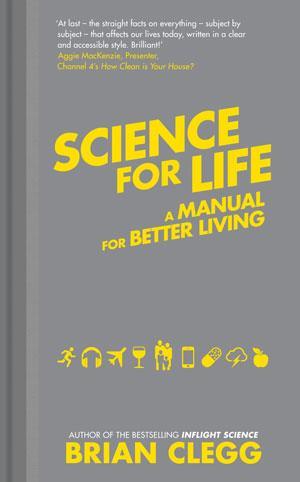Brian Clegg
Icon Books Ltd
2015 | 400pp | £16.99
ISBN 9781848318182

Media hype, celebrity endorsements, old wives’ tales, biased scientific studies and sometimes just a lack of understanding mean we are often bombarded with contradictory statements and competing claims. Are there any benefits to superfoods? Does brain training really work? And what is science’s stance on the benefits (or drawbacks) of drinking red wine? Brian Clegg, who has published over 20 popular science books during his career, aims to definitively answer these questions and enable people to make informed choices in his latest book Science for life.
The book addresses seven key areas: diet, exercise, the brain, psychology, health, the environment and fun. Each section includes a brief introduction before delving into a broad range of topics. It’s easy to dip in and out of – each item, whether on E numbers or vaccinations, covers a page or so and presents the scientific background and consensus on the topic. Science for life is aimed at a general audience with an enquiring mind and does not require a strong background in the subject areas discussed to understand the content.
One potential downside for the more inquisitive reader is that there are no references in the book. Quite often studies are mentioned but the lead author or publication year are not, and readers who would want to further assess the scientific basis for different claims – for example, the effect of processed meat on health – would have to do some searching. Clegg does refer to resources such as the Cochrane Reviews, a medical research database run by the Cochrane Collaboration, but independent sources like this are not provided for all subject areas.
Science for life is an up-to-date publication that refers to recent developments such as the 5:2 diet and high-intensity interval training. However, as we add to our knowledge base with more research on topics like nuclear fusion and hybrid fuel cell technology, we are likely to need more guidance on where to find the facts. Clegg has addressed this by creating an accompanying Science for lifewebsite with short blog-style posts on topics such as herbal medicine, with new articles being posted every week.
Overall, Science for life is a thought-provoking read for anyone interested in discovering a bit more about the things that impact our daily lives. Also, carrots really can help you seen in the dark.
Purchase Science for life: a manual for better living from Amazon.co.uk












No comments yet